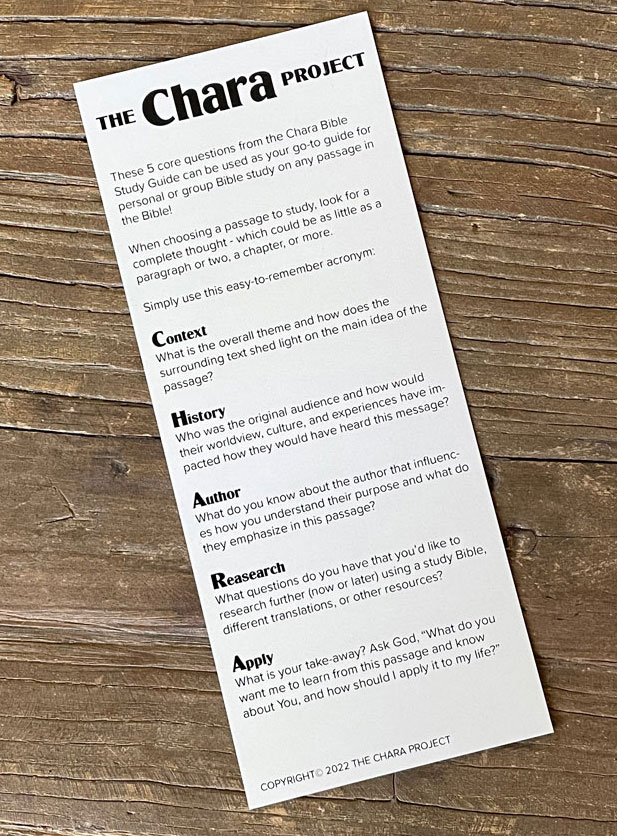“First let the children eat all they want,” he told her, “for it is not right to take the children’s bread and toss it to the dogs.” (NIV)
Welcome to the Bible Study Guide for Mark 7:27, which leverages questions from the CHARA Bible Study Guide, when studying this verse. Below are the questions the Chara team chose to ask, in the order they chose to ask them, but feel free to use other questions or change up the order as you dive into this passage. For ANSWERS from the Chara team on these questions, check out the video below.
RESEARCH
Observations & Questions: What questions do you have when you read this passage? (Hint: it could be as simple as “What is Jesus talking about here?”)
CONTEXT
Immediate: What is the theme or main idea found in the surrounding paragraph(s) and how does that help determine what the verse means? What do we learn about Jesus’ interaction with the woman in Tyre? (Hint: Read at least Mark 7:24-30 to get the story around Mark 7:27).
Bible: Does my interpretation hold true throughout the rest of the Bible? Is this story captured somewhere else in another gospel? How does that help provide clarity to our verse? (Hint: Cross references will likely lead you to Matthew 15:21-28 Look for how Matthew describes the “children”.)
RESEARCH
Translations: Does another Bible translation (or version) add perspective or clarity on what the original language was trying to communicate in Mark 7:27? (Hint: Check out the New Living Translation or Amplified Bible to see how they refer to the “children”.)
Resources: What insights do you learn from Biblical scholars provided in Study Bibles, commentaries, and credible online resources? Note: One thing you may discover is that typically Gentiles (non-Jews) were referred to as “dogs” by Jewish people – likely tied to dogs being unclean, and Jews viewing Gentiles as unclean because they didn’t follow the Law of Moses. That said, when RESEARCHING word meanings, the Greek word for “dog” that Jesus used in this passage is “kynarion”, which referred to a little dog or puppy. Jesus is being gentle with his words here! It’s not meant as an insult and we can see that in the woman’s response – she didn’t seem to flinch at Jesus’ comments. And instead she repeated it back! What other insights do you discover with credible resources?
HISTORY
Who was it written about? What does the text in Mark 7:24-30 and Matthew 15:22-28, or Study Bible notes, tell us about the woman in our passage?
Where does the narrative take place? What can you learn about their town? (Hint: Look up Tyre in a Bible concordance, or look at cross references of Mark 7:24 to see where else Tyre is mentioned in the Bible. For example: check out Matthew 11:21-22 to learn more about the attitudes of the people of Tyre.)
How would the original audience have heard this message? Based on what you now know about the meaning of “dogs” and “children” how would the original hearers interpret Jesus’ comment? (Hint: use study Bible or commentary notes as a guide.)
APPLY
Express: What fears or concerns do you have about applying what you’ve learned?
CONTEXT
Bible: Our interpretation so far may lead a person to believe that Jesus only loves the Jews. Does my interpretation hold true throughout the rest of the Bible? Use cross references and a concordance to check out what other passages say about the relationship between Gentiles (non-Jews) and Jews. (Hint: Galatians 3:26-29, Romans 1:16 and Romans 10:11-13 are a great starting point.)
APPLY
Respond: What was expected of the original audience and what principles make sense for us now (is it a cultural or timeless truth)? Keep in mind that Jesus had a specific plan and order in which He was revealing Himself to the world during His ministry on earth. With that in mind, is this considered a cultural truth meant only for those people back then in that time period, or a timeless truth meant for all people across time?
Ask: What do you learn about God – His character, attributes, or desires?
Pray: “Lord, what do you want me to learn and how should I apply this to my life?”


